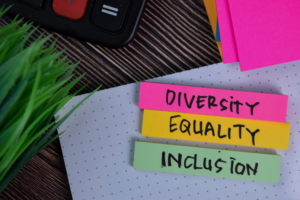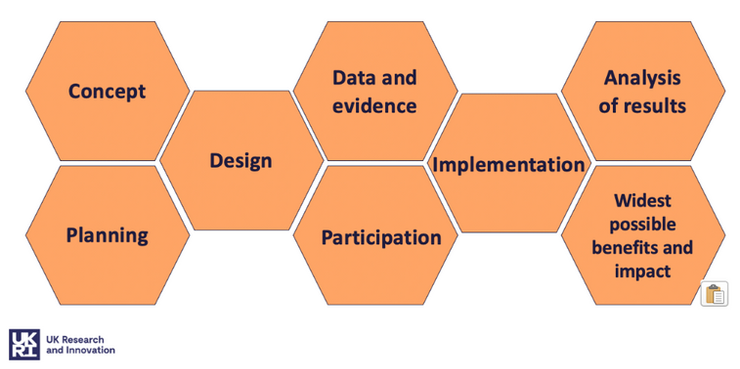By Katie Nicoll Baines, FLFDN Equality, Diversity and Inclusion Manager and Cheryl Hewer, UKRI Equality, Diversity and Inclusion Lead

At the 2021 FLF Annual Conference, the FLF Development Network collaborated with colleagues at UKRI to hold sessions to understand how to conceptualise inclusive research and innovation design and how this relates to the work you do. We built on those initial sessions by co-chairing an energetic roundtable discussion in November 2021 with the aim of exploring with you, our future leaders, what good inclusive research and innovation design looks like. We set out in our previous blog that when research and innovation is truly reflective of the diversity of the population as a whole, the credibility and relevance of that research and innovation is enhanced for all. This is also at the heart of UKRI’s vision for a research and innovation system in the UK that gives everyone the opportunity to contribute and to benefit and supported through UKRI’s four principles for change: diversity, connectivity, engagement, and resilience.
Through these early insightful discussions with you, a set of key themes emerged. One most notable was the recognition of time: time to be curious, ask questions and fully explore the necessary elements to make your research and innovation activities inclusive. Time to create and convene inclusive spaces and dialogue with diverse communities and the public to enable the building of strong, effective relationships. As well as the time to understand and translate that into the design and delivery of an inclusive research and innovation project.
Further themes focussed around the who, what, where, why and when. For example, where might there already be support or existing good practice? How can I learn from this and from others? Who might be role models? What do I need to effectively support a diverse and inclusive research team?
We are really excited that FLFs are contributing to improving inclusive research and innovation design through a variety of projects supported by the Plus Funds. The projects are using different approaches, exploring more inclusive practices across different disciplines. For example:
- RES-WELL: Developing a toolkit for Researcher Wellbeing to support principal investigators and their funders on ethically and emotionally challenging research topics
- Integrating equality, diversity, and inclusion into research culture: a project conducting a Delphi study consulting a wide range of stakeholders on their views about EDI in research culture which is linked to a project that will disseminate the findings using online content (videos/podcasts) for social media to enhance reach
Looking beyond the FLFs, over the course of the past year alone there continues to be a strong momentum for developing and improving inclusive practices and design, both nationally and internationally. This includes a framework for sex, gender, and diversity analysis in research, recently published in Science, which collected emerging global practices to understand and improve efforts to enhance international collaborations and research excellence. Publishers and other funders are also setting out commitments. For example, Springer Nature with a commitment to diversity, equity and inclusion in research publishing and the Wellcome Trust have also set out in their Strategy goals for all Wellcome funded research to be inclusive in both design and practice by 2031.
There are various activities underway across UKRI contributing to advancing inclusive research and innovation design. These are informed and shaped by close collaborations with various communities and include:
- EPSRC have introduced expectations to help the engineering and physical sciences community to identify and address the specific EDI barriers in their own environment.
- Following close working with their community through a survey, working groups and workshops, MRC introduced new requirements expecting applicants to use both sexes of animals, tissues and cells by default and applicants should provide justification for single sex studies. Further work on human participation is also progressing.
- Within innovation, Innovate UK is working with the KTN to develop a programme on Inclusive Innovation which includes funding for ‘inclusive innovation’ awards and longer-term work to develop a toolkit.
- Additionally, AHRC established the Creative Communities programme aiming to capture the explosion of collaboration and connectivity to unlock the potential of arts and culture post-COVID
As we see the needle shifting and approaches to research and innovation design become more inclusive, we want to continue to shape policies and practice informed by, and which support the work of our aspiring future leaders. Building on the valuable insights and discussions with you previously, we are excited to hold a second round- table on 2nd May . The focus will be ‘policy into practice’ with UKRI and Wellcome Trust sharing their latest policy work. You will also hear from the UKRI Public Engagement team following the recent publication of the UKRI Public Engagement Strategy about various programmes across UKRI that are supporting sustainable community involvement in research and innovation and how this contributes to inclusive research and innovation design. Please sign up HERE.[/vc_column_text][/vc_column][/vc_row]

